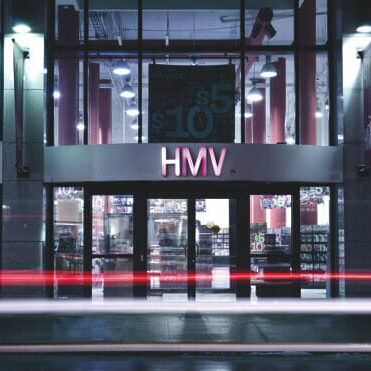

Halifax's Spring Garden Rd. HMV is one of the only two street-side locations in Canada (Read: not in a mall). The other is on Toronto's Queen St. West. Photo by Calum Agnew
When I was in high school my mum would give me $20 allowance a week. Without fail, every weekend I would head down to my local CD retailer and buy something that would change my life.
Whether it was The Clash’s self-titled debut, The Chemical Brothers’ Dig Your Own Hole or Sonic Youth’s Daydream Nation, for at least a week these records would be the best albums I’d ever heard, and would gain constant rotation in my ever-expanding CD collection.
Now I’m 24. I buy about 4 CDs a year (most of the time I get them for free from the places I freelance for) and, truth be told, I download quite a bit. But for the past year I don’t think I’ve felt the pleasure I once got from listening to albums when I was a teenager in my bedroom.
So this may sound kind of hypocritical, but I think the online piracy of music is ruining how we interact with art. And although I’d like to believe outlawing illegal online distribution could reverse this, we’ve likely dug ourselves a hole from which we can never escape—and all because we’re too fucking cheap to buy a $12 record by Fleet Foxes.
As I write this, I have 6966 pieces of music on my iTunes (that’s 19.4 days of non-stop music). But when I look at the Top 25 most listened tracks on my iTunes, I quickly discover that my top most listened to song has only been played 26 times (The Drums’ “Let’s Go Surfing”), while the 25th track has been played a mere 15 times (Two Door Cinema Club’s “Something Good Can Work”, a song I don’t even actually like).
This suggests two things. The first is that I rarely listen to songs for their entire duration anymore. The second is that even though I have almost three weeks worth of music on my iPod I probably don’t listen to most of it.
I blame all of this on the distribution of music online. Because what Internet piracy has done is not open the doors to bands we would never encounter (in fact, we probably encounter more shitty bands we wish we’d never heard of), or “level the playing field” between massive corporate record labels and consumers. All it’s really doing is turning us into a group of consumers unwilling to pay for anything. In doing so it has made most forms of media redundant, because we no longer allocate any actual worth to it.
Why is Hollywood content to release terrible remakes and sequels to shitty films? Because they know it sells. The same goes for the record industry, as they push releases that almost every listener can enjoy.
It’s no secret that the music industry is fucked. Twenty years ago the highest selling record was the soundtrack to the original motion picture The Bodyguard. Even though no one remembers this movie (and the critics hated it upon its inception), the strength of Whitney Houston’s “I Will Always Love You” propelled this record to the top of the charts. It went platinum 17 times, and to date it has sold over 40,000,000 units worldwide.
But times have changed. Those were the times when musicians actually made money. (British pub-rock Nick Lowe, whose song “(What’s So Funny About) Peace, Love and Understanding” was covered by Curtis Stigers in The Bodyguard. On the songwriting royalties alone he made $1.547 million).
Now let’s look at the album charts 19 years later. Rolling Stone reported in April 2011 a slow down in the rapid decrease of album sales—dropping only 1.3 per cent in the first four months of the year—showing signs that the record industry could bounce back. Over the next eight months the record industry would have a surprisingly good turn of fortune by actually selling some records.
But let’s look at the Top 3 of the Billboard Top 200 in 2011: Adele’s 21, Taylor Swift’s Speak Now and Lady Gaga’s Born This Way. What do all three of those musicians have in common? Crossover appeal.
Adele undoubtedly made a pretty good record with 21, selling 17 million copies worldwide (Semisonic’s Dan Wilson made merely $882,700 in royalties with his co-writing on the record, compared to Nick Lowe 19 years earlier). But think about the kind of audience that Adele attracts. Middle-aged parents and baby boomers, each of whom miss the singer-songwriter days of Carole King? Check. Teenagers who like pop songs? Check. Twenty-something hipsters who are R&B revivalists? Check. Adele sold a lot of records simply because everyone (and I mean everyone) liked her. Young, old, really old—she hit all the demographics.
People generally complain about the lack of good music at the top of the charts. But by having such innocuous musicians occupying the top tier of the industry, this will only reinforce record labels to keep doing what they’re doing. Unlike in the early 90s when record labels would snatch up fringe alternative acts in the hopes of striking a goldmine (like DGC did with Nirvana) in the future they’ll instead focus on finding artists that you and your mother will like. They’ll take the easy way out instead of taking a gamble, because with the industry in such rough shape, what they need is a sure thing, even if it’s a commercial jingle-writer who blatantly rips off Gorillaz and MGMT (I’m looking at you, Mark Foster of Foster the People).
You know, people make a lot of weird metaphors when referring to online piracy (like naming it after something pirates do). But in reality it’s kind of like going to a dessert buffet at a wedding. You didn’t pay for anything. You have no reason to eat anything once you’re full. But you have to try that cheesecake, and then some cookies, and then pie, and cake, and some sort of figgy-pudding. At the end you realize you didn’t even want all that stuff to begin with, but once you saw it, you just had to try some.
That’s how I feel about online music piracy. No one told me to download The Cure’s discography (which I don’t think I’ve ever listened to), or every My Bloody Valentine B-side that ever existed. But I got them anyway, simply because I could. And because it was free.
But now that I have everything my favourite bands have ever released, I no longer feel the excitement I once felt saving up each weekend to buy a CD that would change my life. Now I just have a collection of hundreds of hours of music I don’t even listen to.






